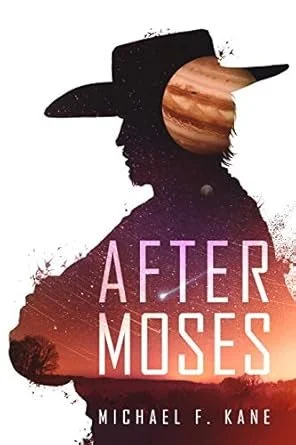Book Review: After Moses by Michael F. Kane
After Moses by Michael F. Kane is the sort of book you should definitely judge by the (pretty cool!) cover. Kane does a good job blending the gritty charm of classic westerns with the drama and intrigue of space opera.
Our protagonist, Matthew Cole, is a freelancer for hire with a heart of gold, who often ends up in a tough situation by doing the right thing. He still manages to gather a crew of similarly well-intentioned and misfortune-prone misfits along the way, and the relationships (and conflicts) between this newfound family take up a huge part of the narrative. The rest is mostly dedicated to exploring the extensive universe of After Moses as it’s revealed through their travels along the many planets, moons, asteroids, settlements, and factions of humanity scattered across the solar system, setting the groundwork for what promises to be a great series.
The loner with strong morals and a dark past, flying a barely functioning ship at a relentless pace, finding work (and trouble) everywhere he goes puts me in mind of Firefly, specifically the board game, with its motto, "Find a crew, find a job. Keep flying." The rest of the cast does not remain in his shadow, though, nor is it there just as a foil for the protagonist; quite the contrary, they stand out in their own right, with their own dilemmas, ambitions, and history.
Thematically, After Moses explores the perils of digital gods, featuring the solar system plunging into a dark age after humanity's AI benefactor sudden and mysterious disappearance. The AI’s origin, intentions, or the cause of its disappearance are not clear (I guess you’ll need to read the rest of the series to find that out), only the fact that humanity became dependent on its existence and technology, and now can’t govern itself, even decades after Moses’ disappearance. By relying on AI, humanity forgot how to be self-reliant, something we are witnessing with greater frequency these days. The metaphors are not subtle, especially regarding people's tendency to isolate themselves into tribes, safe in their own little worlds, waiting for a miracle.
The prose is clear-cut with the occasional flair of wit and poetry. The pacing is brisk but not overwhelmingly so. Following the narrative is easy and satisfying. After Moses, like most debut novels and first installments in a series, is not perfect. But I can see the potential for a brilliant series, both in the worldbuilding, prose and style. I particularly enjoyed the setting and ambitious scope of this story as well as the cautionary tale regarding humanity’s increasing reliance on technology.
Overall, After Moses is an original story crafted from well-established tropes that should please its audience. If you enjoy Firefly and The Expanse, you'll probably enjoy many of the elements in this book.


